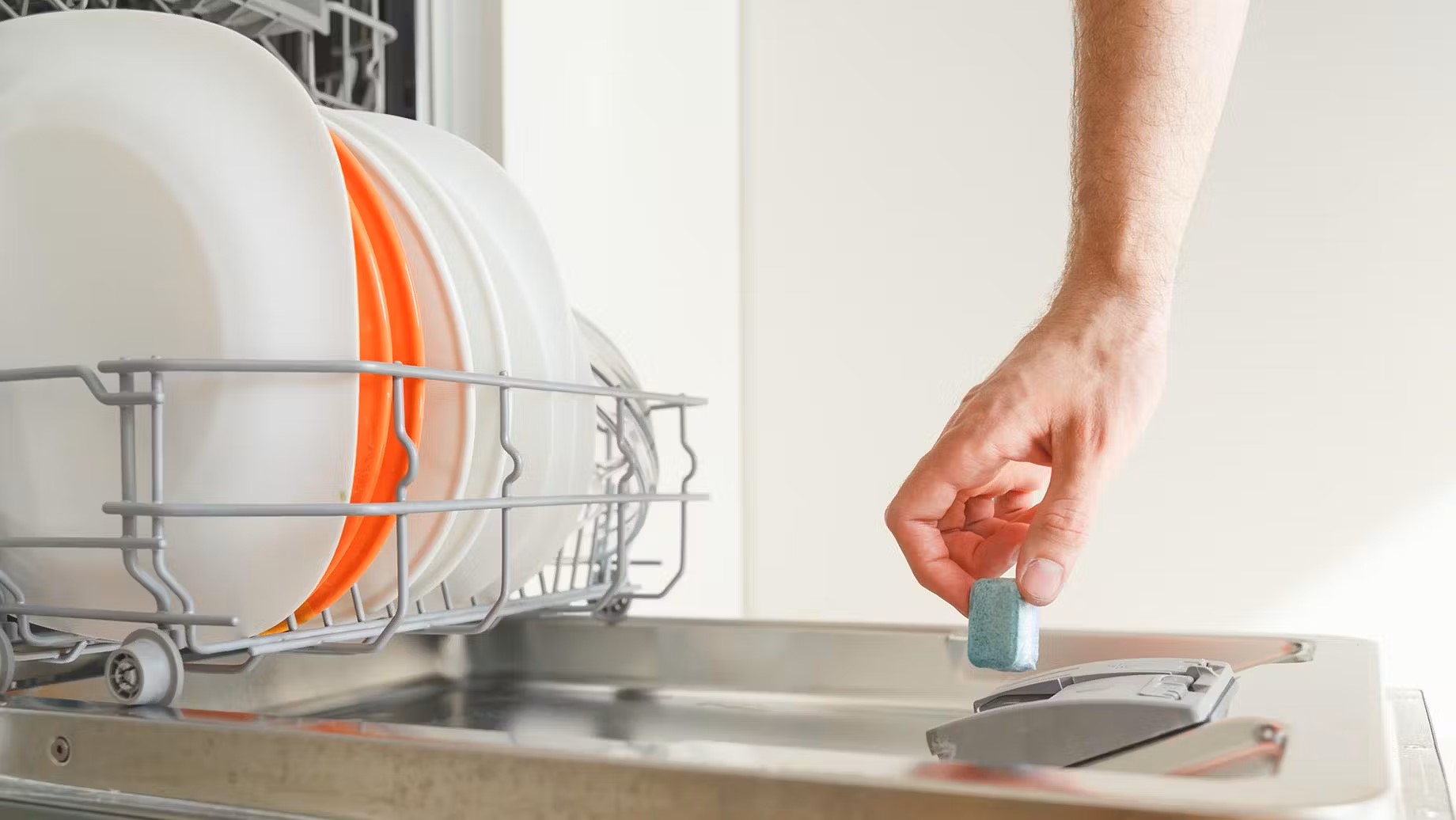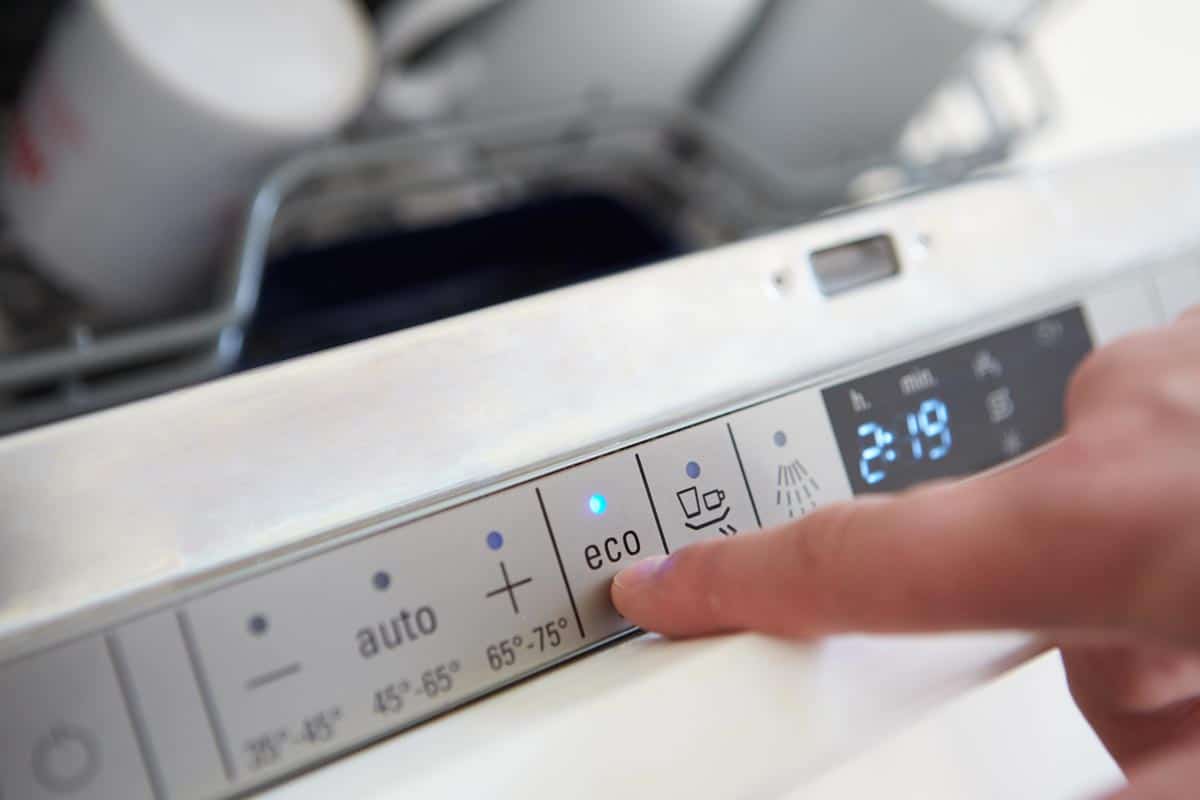

Articles
How Much Does It Cost To Run A Dishwasher
Modified: January 19, 2024
Discover the average cost of running a dishwasher in this informative article. Learn how to save money on utility bills while ensuring sparkling clean dishes.
(Many of the links in this article redirect to a specific reviewed product. Your purchase of these products through affiliate links helps to generate commission for Storables.com, at no extra cost. Learn more)
Introduction
Running a dishwasher has become a common practice in many households around the world. Not only does it save time and effort, but it also ensures sparkling clean dishes without the hassle of manual washing. However, many people are often concerned about the cost of running a dishwasher. Is it expensive? How much does it add to your monthly utility bills? In this article, we will delve into the factors that affect the cost of running a dishwasher and provide you with some tips to minimize these expenses.
When it comes to calculating the cost of running a dishwasher, several factors come into play. These factors include the energy consumption of the dishwasher, the water consumption, the cost of detergent and rinse aid, as well as any maintenance and repair costs that may arise. By understanding and managing these factors effectively, you can ensure that your dishwasher runs efficiently while keeping your costs in check.
Before we dive into the specifics, it’s important to note that the cost of running a dishwasher can vary depending on various factors such as the frequency of use, the efficiency of the dishwasher model, the local energy and water rates, and the type of detergent used. Therefore, the figures provided in this article are meant to serve as general guidelines, and it’s recommended to consider your own circumstances when estimating the cost.
In the following sections, we will discuss each of the factors affecting the cost of running a dishwasher in more detail. Understanding these factors will empower you to make informed decisions to optimize your dishwasher’s efficiency and minimize the associated expenses.
Key Takeaways:
- Opt for energy-efficient and water-efficient dishwasher models with ENERGY STAR certification to reduce electricity and water bills. Practice mindful detergent usage and regular maintenance to minimize overall running costs.
- Implement cost-saving strategies such as efficient loading, skipping pre-rinsing, and using energy-saving modes to significantly reduce the cost of running a dishwasher while maintaining cleanliness and convenience.
Read more: How Much Does A Fan Cost To Run
Factors Affecting the Cost of Running a Dishwasher
Several factors play a significant role in determining the cost of running a dishwasher. By understanding these factors, you can take proactive steps to manage your expenses. Let’s take a closer look at each of these factors:
1. Energy Consumption of Dishwashers
The energy consumption of a dishwasher is a key contributor to the overall cost of running it. Dishwashers come with different energy efficiency ratings, ranging from standard to high-efficiency models. Energy-efficient dishwashers are designed to use less electricity, helping you save on your electric bill. When purchasing a dishwasher, look for models that are ENERGY STAR certified, as they meet rigorous energy efficiency standards and can significantly reduce your energy consumption.
2. Water Consumption of Dishwashers
Water consumption is another crucial factor that impacts the cost of running a dishwasher. Older dishwasher models tend to use more water per cycle, leading to higher water bills. Newer models, on the other hand, are designed to be more water-efficient, using less water while still providing effective cleaning. Check the water usage specifications of different dishwasher models before making a purchase to ensure you choose one that meets your needs while minimizing water consumption.
3. Cost of Detergent and Rinse Aid
The cost of detergent and rinse aid is an ongoing expense when running a dishwasher. While there are various brands and types of dishwasher detergents available in the market, it is essential to choose an effective yet affordable option. Look for detergent options that are specifically designed for dishwashers to ensure optimal cleaning performance. Additionally, using a rinse aid can improve drying results and reduce water spots, but be mindful of the cost as it can add up over time.
Read more: How Much Does An AC Cost To Run
4. Maintenance and Repair Costs
Over time, dishwashers may require maintenance or repair, which can contribute to the overall cost of running the appliance. Regular maintenance, such as cleaning the filters and checking for any blockages, can help prevent costly repairs. However, it’s important to budget for potential repairs or parts replacement, as well as considering warranty options when purchasing a new dishwasher.
By considering and managing these factors, you can optimize the cost of running a dishwasher and ensure that it remains an efficient and cost-effective appliance in your home. In the next sections, we will explore specific tips and strategies to help you reduce these costs even further.
Energy Consumption of Dishwashers
The energy consumption of a dishwasher is an important factor to consider when determining the cost of running it. By understanding how energy efficiency plays a role, you can make informed decisions to minimize your energy expenses. Here are some key points to understand:
1. Energy Efficiency Ratings: Dishwashers are labeled with energy efficiency ratings that range from standard to high-efficiency. Look for models that are ENERGY STAR certified, as they meet stringent energy efficiency standards set by the Environmental Protection Agency (EPA) in the United States. These models are designed to use less electricity, saving you money on your energy bills in the long run.
2. Energy-Saving Features: Many modern dishwashers come equipped with energy-saving features that can help reduce energy consumption. Look for models that have options such as eco mode or energy-saving mode. These modes adjust the dishwasher’s settings to minimize energy usage without compromising cleaning performance. Additionally, some dishwashers have sensors that can detect the load size and adjust the cycle length and water temperature accordingly, further optimizing energy efficiency.
3. Water Heater Temperature: The temperature of the water heater supplying hot water to the dishwasher can impact energy consumption. Most dishwashers have internal heating elements to heat the water to the desired temperature. However, using hot water from the water heater instead can reduce energy consumption. Set your water heater temperature to a lower setting to reduce energy usage not only for your dishwasher but for other hot water needs as well.
4. Load Size and Cycle Selection: Running your dishwasher when it’s fully loaded helps maximize energy efficiency. Avoid running partial loads as it wastes both water and energy. Additionally, selecting the appropriate cycle for your load can also make a difference. Pre-rinsing dishes is often unnecessary and can consume extra water and energy. Instead, scrape off excess food before loading the dishwasher and choose energy-saving or eco-friendly cycles whenever possible.
5. Unplug or Use Delay Start: When not in use, consider unplugging your dishwasher or using the delay start feature if available. Even in standby mode, appliances can consume energy. By unplugging or using delay start, you can further reduce energy usage and save on your utility bills.
By considering these energy-saving tips and utilizing the energy-efficient features of your dishwasher, you can significantly reduce the energy consumption and associated costs. Remember, every small step counts, and your efforts to conserve energy not only benefit your wallet but also contribute to a more sustainable and environmentally-friendly home.
Water Consumption of Dishwashers
The water consumption of a dishwasher is an important factor to consider when determining the cost of running it. By understanding how to minimize water usage, you can make conscious choices that will lower your water bills. Here are some key points to consider:
1. Water Efficiency Ratings: When shopping for a new dishwasher, look for models that have high water efficiency ratings. These models are designed to use less water per cycle, helping you conserve water and reduce your water bills. Look for dishwashers with the WaterSense label, which indicates that they meet the water efficiency criteria set by the Environmental Protection Agency (EPA) in the United States.
2. Load the Dishwasher Efficiently: Properly loading the dishwasher can help optimize water usage. Make sure to load dishes efficiently, ensuring that they are not overcrowded and allowing water to reach and clean each dish effectively. Avoid blocking the spray arms or placing tall items that may interfere with water distribution. By maximizing the dishwasher’s capacity and organizing the load properly, you can minimize the number of cycles needed and ultimately reduce water consumption.
3. Skip Pre-Rinsing: Modern dishwashers are designed to effectively clean dishes, even when they are not pre-rinsed. Instead of rinsing each dish before loading it into the dishwasher, scrape off excess food particles, such as large chunks or leftovers, to prevent clogging the dishwasher’s filter. By skipping pre-rinsing, you can save both water and time while still achieving clean and sparkling dishes.
4. Select Appropriate Wash Cycle: Most dishwashers offer multiple wash cycle options, such as light, normal, and heavy. Selecting the appropriate wash cycle based on the level of soiling can help optimize water usage. For lightly soiled dishes, choose shorter and more efficient wash cycles. Reserve longer and more intensive cycles for heavily soiled items. Adjusting the wash cycle based on the load’s condition can help save water without compromising the cleaning performance.
5. Repair Leaks and Malfunctions: Regularly inspect your dishwasher for any leaks or malfunctions that may cause unnecessary water wastage. Leaks not only waste water but can also result in additional repair costs and potential damage to your kitchen. If you notice any leaks or issues with your dishwasher, address them promptly to minimize water waste.
By implementing these water-saving strategies and selecting a water-efficient dishwasher, you can significantly reduce water consumption and save on your water bills. Remember to practice mindful water usage not only with your dishwasher but also throughout your daily routines to promote sustainability and environmental conservation.
Cost of Detergent and Rinse Aid
The cost of detergent and rinse aid is an ongoing expense when it comes to running a dishwasher. By being mindful of your choices and finding cost-effective solutions, you can manage these expenses efficiently. Here are some key points to consider:
1. Choose Affordable Detergent: There are various dishwasher detergents available in the market, ranging from budget-friendly options to premium brands. While it can be tempting to go for the most expensive ones, it’s important to remember that higher price doesn’t always guarantee better cleaning performance. Look for affordable dishwasher detergents that have good customer reviews and proven effectiveness. It’s worth experimenting with different brands to find one that offers a balance of cost and quality.
2. Consider Store Brands or Generic Options: Instead of exclusively relying on well-known brands, explore store brands or generic alternatives. These options often offer comparable cleaning performance at a lower price point. Check the ingredients and ensure they are suitable for your dishwasher. By exploring different options and comparing prices, you can find a cost-effective detergent that meets your cleaning needs.
3. Measure Detergent Properly: Using excessive amounts of detergent not only wastes the product but can also cause buildup and lead to poor cleaning results. Follow the manufacturer’s instructions and use the recommended amount for each load. Pay attention to the hardness of your water since higher levels of minerals may require more detergent. By properly measuring detergent, you can maximize its usage and reduce unnecessary expenses.
4. Utilize All-in-One Products: Some dishwasher detergents come in all-in-one formulas, combining detergent, rinse aid, and even dishwasher cleaner. These multi-purpose products can simplify your shopping list and potentially save you money. Experiment with all-in-one options to see if they meet your cleaning expectations while reducing the need for separate rinse aid and other additives.
5. Extend Rinse Aid Usage: Rinse aid is an optional additive that helps improve drying performance and reduces water spots on dishes. While it may add to the cost of running a dishwasher, there are ways to extend its usage. Adjust the rinse aid dispenser to a lower setting to decrease the amount used per cycle. Additionally, keeping the dishwasher’s rinse aid reservoir filled regularly will help ensure consistent and efficient usage without unnecessary waste.
Remember to balance cost and effectiveness when choosing detergent and rinse aid options for your dishwasher. By exploring affordable options, measuring detergent properly, utilizing all-in-one products, and extending rinse aid usage, you can manage the cost of these ongoing expenses and make running your dishwasher more economical.
Read more: How Much Does A Dishwasher Cost
Maintenance and Repair Costs
When it comes to the cost of running a dishwasher, it’s essential to consider the potential maintenance and repair expenses that may arise over time. By understanding these costs and being proactive in your dishwasher’s care, you can minimize unexpected financial burdens. Here are some key points to keep in mind:
1. Regular Maintenance: Regular maintenance of your dishwasher can help prevent costly repairs in the long run. Clean the dishwasher’s filters regularly to ensure proper water flow and prevent blockages. Remove any debris or food particles that may accumulate in the spray arms or other components. Refer to the manufacturer’s instructions for specific maintenance guidelines for your dishwasher model.
2. Address Issues Promptly: If you notice any issues or unusual behavior with your dishwasher, address them promptly. Ignoring a minor problem can lead to more significant issues down the line and result in costly repairs. Look out for signs such as leaks, unusual noises, or improper cleaning performance. If you are unable to resolve the issue yourself, contact a professional technician for assistance.
3. Professional Servicing: Consider scheduling periodic servicing by a professional technician to ensure that your dishwasher is in optimal condition. A technician can thoroughly inspect the appliance, identify any potential issues, and perform necessary maintenance tasks. While there may be a cost associated with professional servicing, it can help prolong the lifespan of your dishwasher and prevent costly breakdowns.
4. Warranty Coverage: When purchasing a new dishwasher, consider the warranty coverage provided by the manufacturer. Warranties can vary in length and coverage, so thoroughly review the terms and conditions before making a decision. A comprehensive warranty can provide peace of mind and cover the cost of repairs or replacement parts during the specified period.
5. DIY Repairs: For minor issues, you may be able to handle repairs yourself, saving on service costs. However, it’s important to be cautious and have the necessary knowledge and skills to perform the repairs safely and effectively. Consult the appliance’s manual or reputable online resources for guidance. For complex or potentially dangerous repairs, it’s best to consult a professional technician to avoid causing further damage or compromising safety.
By adopting a proactive approach to maintenance, addressing issues promptly, considering professional servicing, knowing the warranty coverage, and being cautious with DIY repairs, you can mitigate maintenance and repair costs associated with running a dishwasher. Regular care and prompt action can help keep your dishwasher functioning smoothly and minimize unexpected financial burdens.
Comparison of Dishwasher Models and Their Costs
When considering the cost of running a dishwasher, it’s important to compare different dishwasher models and their associated costs. By understanding the features, efficiency, and pricing of various models, you can make an informed decision that aligns with your budget and requirements. Here are some key points to consider when comparing dishwasher models:
1. Energy Efficiency: Look for dishwasher models that have high energy efficiency ratings. ENERGY STAR certified dishwashers are designed to use less energy, which can result in significant savings on your utility bills over time. Compare the energy consumption of different models to find one that offers optimal efficiency while still meeting your cleaning needs.
2. Water Efficiency: Consider the water efficiency of dishwasher models as well. Look for models that have low water consumption per cycle, as this can help minimize your water bills. Dishwashers with adjustable load sensing or soil sensing features can optimize water usage by detecting the load size and adjusting water levels accordingly.
3. Cleaning Performance: While efficiency is important, it’s crucial to choose a dishwasher model that offers excellent cleaning performance. Read customer reviews and check independent testing results to ensure that the models you’re considering can effectively clean dishes, even when heavily soiled. Comparing the cleaning capabilities of different models will help you find the right balance between performance and efficiency.
4. Cycle Options and Customization: Evaluate the available cycle options and customization features of dishwasher models. Look for models that offer a variety of cycle presets, such as quick or eco-friendly cycles, to accommodate different loads and cleaning needs. Dishwashers with adjustable racks or specialized loading features can improve the efficiency and effectiveness of the cleaning process.
5. Price and Longevity: Compare the prices of different dishwasher models and consider their longevity. While it may be tempting to opt for the cheapest model available, it’s important to balance cost with durability and reliability. Investing in a higher-quality dishwasher with proven performance can result in long-term savings, as it may require fewer repairs or replacements over its lifespan.
6. Additional Features: Consider any additional features or technologies that may be important to you. Some dishwashers offer features like adjustable upper racks, quiet operation, delayed start options, or advanced drying functions. These features may enhance convenience and user experience but may also come at an additional cost.
By thoroughly comparing dishwasher models based on energy efficiency, water consumption, cleaning performance, cycle options, price, longevity, and additional features, you can find a model that suits your budget and meets your cleaning needs. Keep in mind that the initial cost should be considered alongside potential long-term savings in energy, water, and maintenance expenses.
To save on the cost of running a dishwasher, wait until it’s full before running it, use the energy-saving mode, and consider using a dishwasher detergent that is specifically designed for lower water and energy usage.
Tips for Reducing the Cost of Running a Dishwasher
Running a dishwasher doesn’t have to break the bank. With a few simple adjustments to your habits and routines, you can reduce the cost of running your dishwasher while still enjoying clean and sparkling dishes. Here are some tips to help you save money:
1. Load the Dishwasher Efficiently: Properly load your dishwasher to maximize its capacity and reduce the number of cycles required. Avoid overcrowding or blocking the spray arms, as this can hinder proper water circulation and cleaning. By optimizing the dishwasher’s load, you’ll minimize water and energy usage per load.
2. Run Full Loads: Wait until your dishwasher is fully loaded before running a cycle. Running partial loads wastes water and energy. If you have a small load, consider using the eco or energy-saving cycle option. This reduces the water and energy consumption while still delivering satisfactory cleaning results.
3. Skip the Pre-Rinse: Modern dishwashers are designed to handle food particles and grease, so there’s no need to pre-rinse your dishes before loading them. Simply scrape off large food scraps and let the dishwasher do the rest. Pre-rinsing uses unnecessary water and time, contributing to higher costs.
4. Use Energy-Saving or Eco Mode: Take advantage of energy-saving or eco-friendly modes offered by your dishwasher. These modes optimize water and energy usage while still providing efficient cleaning. Check your dishwasher’s manual to understand the specific features and settings available to you.
5. Adjust Water Heater Temperature: Lowering the temperature of your water heater can help reduce energy consumption when supplying hot water to your dishwasher. As most dishwashers have internal heating mechanisms, using slightly cooler water from the water heater still ensures effective cleaning while saving on energy costs.
6. Use the Delay Start Feature: If your dishwasher has a delay start option, consider using it. This allows you to take advantage of off-peak hours when electricity rates may be lower. By running the dishwasher during these times, you can potentially save money on your energy bill.
7. Choose Energy-Efficient Models: When purchasing a new dishwasher, opt for models that are ENERGY STAR certified. These models are designed to meet strict energy efficiency standards, reducing your energy consumption and ultimately saving you money on your utility bills.
8. Maintain Your Dishwasher: Regularly clean and maintain your dishwasher to keep it running efficiently. Clean the filters, remove any debris or clogs, and inspect the spray arms for any blockages. A well-maintained dishwasher performs better, ensuring optimal cleaning performance and minimizing the need for repairs.
9. Consider DIY Repairs: For minor issues, consider tackling repairs yourself, if you have the necessary skills and knowledge. This can save you money on service fees. However, be cautious and know your limitations. For complex or potentially hazardous repairs, it’s best to consult a professional technician.
10. Shop Smart for Detergent and Rinse Aid: Look for affordable dishwasher detergents and rinse aids that offer good cleaning performance. Consider store brands or generic options, and measure the detergent properly following the manufacturer’s instructions. Also, consider using all-in-one products that combine detergent, rinse aid, and dishwasher cleaner to save costs.
By implementing these tips, you can significantly reduce the cost of running your dishwasher without compromising cleanliness and convenience. It’s all about mindful use, efficient loading, and finding cost-effective solutions that work for you.
Conclusion
Running a dishwasher can be a convenient and time-saving method for cleaning dishes, but it’s important to consider the cost implications. By understanding the factors that affect the cost of running a dishwasher and implementing cost-saving measures, you can maximize efficiency and minimize expenses. From energy and water consumption to detergent costs and maintenance, every aspect plays a role in determining the overall cost.
When it comes to energy consumption, opting for an energy-efficient dishwasher with an ENERGY STAR certification can significantly reduce your electricity bills. Similarly, selecting a water-efficient model and practicing proper loading techniques can help conserve water and lower your water bills. Mindful detergent usage, measuring properly, and exploring affordable options can help minimize the cost of detergent and rinse aid.
Regular maintenance, prompt repairs, and considering warranty coverage can help avoid costly repairs and extend the lifespan of your dishwasher. Comparing dishwasher models based on features, efficiency, and pricing allows you to find a balance between performance and cost.
Implementing simple tips like running full loads, skipping the pre-rinse, using energy-saving modes, and adjusting water heater temperature can further reduce expenses. Using the delay start feature and shopping smartly for detergent and rinse aid can also contribute to cost reduction.
In conclusion, managing the cost of running a dishwasher involves a combination of conscious habits, efficient use, and smart choices. By considering factors such as energy and water consumption, expenses associated with detergent and maintenance, and utilizing cost-saving strategies, you can enjoy the convenience of a dishwasher while keeping your expenses in check. Remember, every small adjustment can add up to significant savings over time.
Frequently Asked Questions about How Much Does It Cost To Run A Dishwasher
Was this page helpful?
At Storables.com, we guarantee accurate and reliable information. Our content, validated by Expert Board Contributors, is crafted following stringent Editorial Policies. We're committed to providing you with well-researched, expert-backed insights for all your informational needs.














0 thoughts on “How Much Does It Cost To Run A Dishwasher”